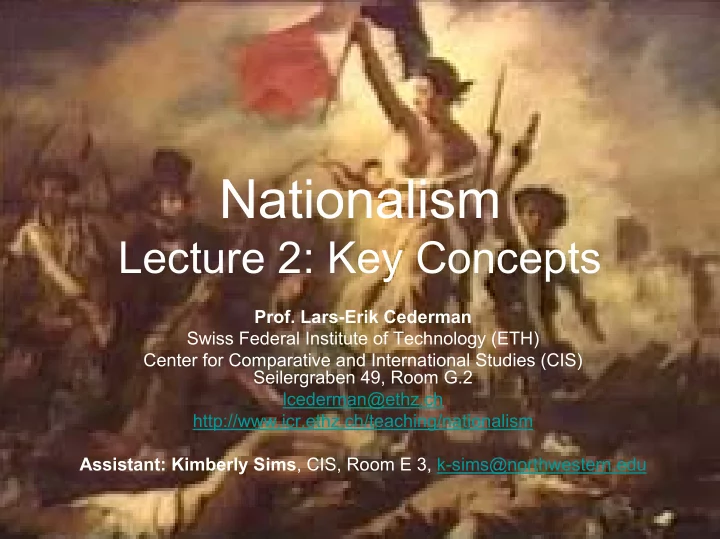

Nationalism Lecture 2: Key Concepts Prof. Lars-Erik Cederman Swiss Federal Institute of Technology (ETH) Center for Comparative and International Studies (CIS) Seilergraben 49, Room G.2 lcederman@ethz.ch http://www.icr.ethz.ch/teaching/nationalism Assistant: Kimberly Sims , CIS, Room E 3, k-sims@northwestern.edu
Why nationalism has been ignored and misunderstood in the West • Zeitgeist of post-WWII period • Scientific biases: – State-Centrism – Behaviorism – Materialism – Individualism – “Presentism”
Basic Concepts • Essentially contested concepts (W. Gallie): – No generally accepted use – Scholars and politicians talk past each other • Key concepts: 1. The State 2. The Nation 3. Nationalism Also: nation-state, ethnic category etc.
1. Defining the state • Max Weber : A formal organization that enjoys monopoly on legitimate violence within its territory • Corollaries: – Internal sovereignty – External sovereignty – Clear boundary Max Weber
2. Defining the nation • Some alternative definitions: – Ernest Renan : “an everyday plebiscite” – Joseph Stalin : “a historically constituted, stable community of Ernest Renan people, formed on the basis of a common language, territory, economic life, and psychological make-up manifested in a common culture” Joseph Stalin
2. Defining the nation, cont’d • Another alternative definitions: – A. D. Smith : “a named human population sharing an historical territory, common myths and historical memories, a mass, public culture, a common economy and common legal rights and duties for all members”
Weber’s definition of the nation • Max Weber : “a community of sentiment which would adequately manifest itself in a state of its own” and thus “tends to produce a state of its own” • Note 1: Imagined community, not objective group • Note 2: Not any conscious group: dependence on state
Ethnicity ≠ Nationalism • An ethnic community (or an ethnie ) is a cultural community based on a common belief in real or putative descent (Max Weber) • An ethnic category are based on cultural markers that are imposed by outside observers (see Paul Brass)
Conceptual Overview Ethnic Ethnic Nation State Category Community Boundaries objective, self-perceived, self-perceived, objective, externally categorical categorical territorial imposed Source of — solidarity, nationalism patriotism & direct links & enforcement categorical cohesion categories mass loyalty Normative — tradition national self- territorial determination sovereignty principle Examples: colonial Germany and Germany and Habsburg peoples before Italy before Italy from early Empire decolonization 19th century 19th C.
3. Defining Nationalism • A. D. Smith 1. process of forming and maintaining nations and nation- states 2. national consciousness 3. language and symbolism 4. ideology or cultural doctrine social and political movemen t 5. • 4. + 5. = “an ideological movement of attaining and maintaining autonomy, unity and identity on behalf of a population deemed by some of its members to constitute an actual nation or potential ‘nation’”
What is that ideology about? A. D. Smith: • World divided into nations • Nation source of all political and social power • Freedom requires national identification • Nations must be free
Defining nationalism continued... • Ernest Gellner : “nationalism is primarily a political doctrine, which holds that the political and the national unit should be congruent” • My modification : “a specific ideology with European origins stating that each nation should possess its own state or at least some degree of territorial self-determination.” Ernest Gellner
States and nations Common state? Absent Present Common nation? I. Anarchy II. Multinational State center secession Absent periphery IV. Nation-State III. Stateless/Split Nation Present unification
Three types of nationalism Common state? no yes Common nation? Separatist no nationalism State-framed nationalism yes Unification nationalism
Recommend
More recommend